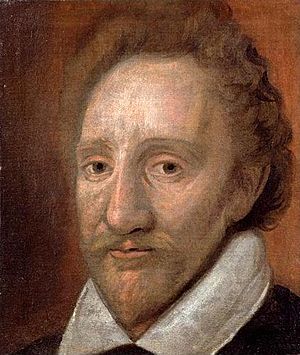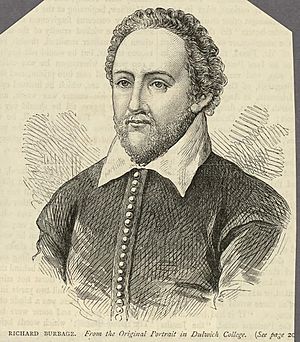Richard Burbage facts for kids
Richard Burbage (born around 1567 – died 13 March 1619) was a very famous English actor. Many people thought he was one of the best actors of his time, especially at the Globe Theatre. Besides acting, he also owned theatres, was a businessman, and even a painter!
Richard was the younger brother of Cuthbert Burbage. Both brothers were actors. Richard Burbage was also a good friend and business partner of the famous writer William Shakespeare.
Richard's father, James Burbage, was a joiner (someone who builds things with wood). He became a theatre owner and built the very first theatre in England. Richard became a popular actor by his early twenties. He was especially good at acting in sad plays, called tragedies.
We don't know much about his early acting days. Like many young actors then, he might have played female roles before becoming famous for male parts. He acted with different theatre groups, like the Admiral's Men and Lord Strange's Men. But he was most famous as the main actor for William Shakespeare's company, the Lord Chamberlain's Men. This group later became the King's Men when King James I became king in 1603.
Richard Burbage played the main character in many of Shakespeare's most famous plays. These included Hamlet, Othello, Richard III, and King Lear. He was also in plays by other great writers like Ben Jonson (in Volpone and The Alchemist) and John Webster (in The Duchess of Malfi).
People described Burbage as being short and strong. But they said he was a very powerful actor. Many people wrote praises about him. The huge size of the roles he played shows how talented he was. He was a big reason why people bought tickets to plays.
Out of thousands of acting roles from 1580 to 1610, only about twenty roles were longer than 800 lines. Richard Burbage played thirteen of these very long, important roles. He was quite rich because he earned money from owning parts of two theatres, being a partner in the King's Men, being a lead actor, and even from his painting.
Contents
Richard Burbage's Life
Richard Burbage was born in London and was baptised on 7 July 1568. He was the second son in his family. His father, James Burbage, had a big impact on Richard's acting career. Since his father built and owned the first successful theatre, Richard had a great start in the theatre world. Working with his father from a young age also taught him about colours and painting. This skill helped him later in life.
Theatre Ownership and the Globe
After their father died in 1597, Richard and his brother Cuthbert took over the family's theatre business. They faced some legal problems. They kept the Blackfriars Theatre but rented it out to a lawyer named Henry Evans. He used it for a group of child actors.
Their other theatre, simply called The Theatre, had to be taken apart. They couldn't agree on a new rental deal with the landowner. So, in 1599, the Burbage brothers moved the wood and parts of The Theatre across the River Thames. They rebuilt it into a new playhouse called the Globe.
The Burbage brothers owned half of the new Globe Theatre. They gave the other half to Shakespeare and other members of the Chamberlain's Men. The money they earned from renting out the Blackfriars Theatre helped them pay for the move to the Globe.
In 1608, the brothers stopped renting out the Blackfriars Theatre. Their acting company, the King's Men, started using it again. Richard Burbage was performing at the Globe on 29 June 1613 when it caught fire and burned down. During the cold winter months, when the open-air Globe was too cold, they used the Blackfriars Theatre. It was much smaller, holding about 700 people.
Family and Art
Richard and Cuthbert Burbage were very close. They lived as neighbours on Halliwell Street in Shoreditch. Richard Burbage married Winifred Turner on 2 October 1600. He had at least eight children. After Richard died, his wife Winifred married another actor from the King's Men, Richard Robinson.
Some people believe that the famous Chandos portrait of Shakespeare was painted by Richard Burbage. His painting skills were well-known. Some even think that the well-known painting of Burbage himself might be a self-portrait. Dulwich College has a painting of a female head that was once thought to be his work. However, in 1987, experts found out it was likely painted by someone else from Italy.
Later Life and Legacy
Unlike other famous actors like Edward Alleyn or even Shakespeare, Burbage never stopped acting. He continued performing until he died at age 52 in 1619. He wasn't as good at business as Alleyn or Shakespeare. When he died, he left his wife about £300 in land. This was a good amount, but much less than what Alleyn or Shakespeare owned when they died.
Richard Burbage remained a favourite with audiences for 35 years. He was a true star of his time. His last recorded performance was in 1610, but he acted with the King's Men until his death in 1619. His death caused so much sadness that it almost overshadowed the official mourning for Queen Anne, who had died just ten days before him.
Burbage was buried in St Leonard's, Shoreditch. This church is near two famous theatres: "The Theatre" and "The Curtain Theatre". People say his gravestone read "Exit Burbage." Even though his gravestone is now lost, a memorial for him and his brothers was put up later. A poet wrote a sad poem about his death, which included these lines:
He's gone and with him what a world are dead.
Which he review'd, to be revived so,
No more young Hamlet, old Hieronimo
Kind Lear, the Grieved Moor, and more beside,
That lived in him have now forever died.
Another short, touching message written after his death was simply:
Exit Burbage.
Richard Burbage in Movies and TV
Richard Burbage has been played by different actors in movies and TV shows:
- Lionel Belmore in Master Will Shakespeare (1936)
- Paul Freeman in Will Shakespeare (1978)
- Martin Clunes in Shakespeare in Love (1998)
- Jalaal Hartley in the Doctor Who episode The Shakespeare Code (2007)
- Steve Speirs in the BBC show Upstart Crow (2016)
- Mattias Inwood in the TNT show Will (2017)
- Adam Colborne in Good Omens (2019)
Portraits of Richard Burbage at the National Portrait Gallery, LondonLua error in Module:WikidataCheck at line 22: attempt to index field 'wikibase' (a nil value).
Images for kids
See also
 In Spanish: Richard Burbage para niños
In Spanish: Richard Burbage para niños
 | Leon Lynch |
 | Milton P. Webster |
 | Ferdinand Smith |




